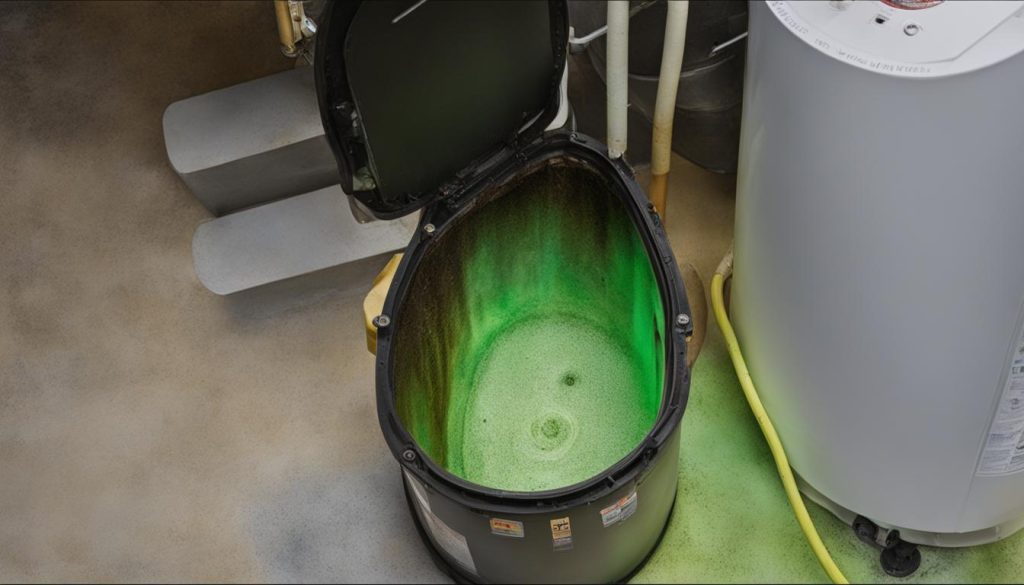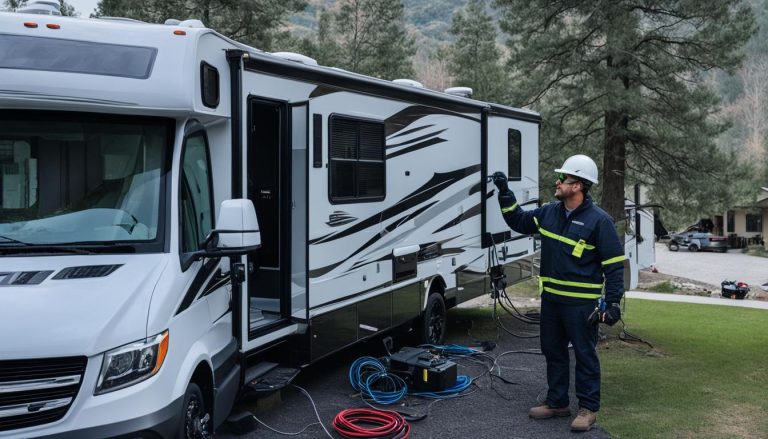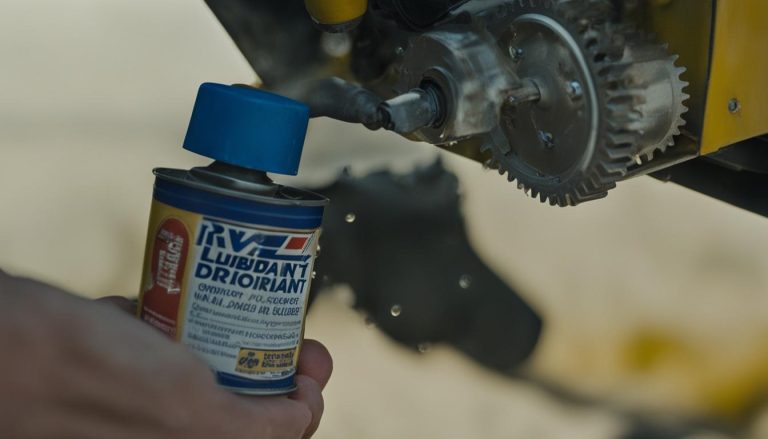RV Water Smells Like Rotten Eggs? Fix It Now!
gorvlifestyle.com and its partners may earn a commission if you purchase a product through one of our links
If you’ve noticed that your RV water has a foul odor reminiscent of rotten eggs, you’re not alone. This unpleasant smell can be attributed to various factors, such as bacteria in the water heater or freshwater tank. By understanding the causes and implementing the appropriate solutions, you can eliminate the odor and enjoy fresh, clean water during your travels.
Key Takeaways:
- RV water can smell like rotten eggs due to bacteria in the water heater or freshwater tank.
- The presence of anaerobic bacteria interacting with the anode rod produces hydrogen sulfide gas, resulting in the foul smell.
- Flushing the water heater with hydrogen peroxide or vinegar can help eliminate the odor.
- Sanitizing the freshwater tank and plumbing system is crucial to get rid of the smell.
- Proper maintenance and preventive measures can prevent the recurrence of the rotten egg smell in your RV water.
Why Does My RV Smell Like Rotten Eggs?
If you’ve noticed a foul odor resembling rotten eggs coming from your RV’s water, you’re not alone. This unpleasant smell can be attributed to various factors that are important to understand in order to effectively address the issue and enjoy fresh, clean water during your travels.
The most common cause of RV water smelling like rotten eggs is the presence of anaerobic bacteria in the water heater. These bacteria interact with the magnesium or aluminum anode rod, producing hydrogen sulfide gas and creating the foul smell. Another potential cause is bacteria in water hookups or the freshwater tank. Identifying these causes is crucial in determining the appropriate solutions to fix the odor issue.
Let’s take a closer look at each of these causes:
Anaerobic Bacteria in the Water Heater
When anaerobic bacteria interact with the magnesium or aluminum anode rod in your RV’s water heater, they produce hydrogen sulfide gas, resulting in the unpleasant rotten egg smell. This is a common occurrence that can be resolved through proper maintenance and treatment.
Bacteria in Water Hookups or Freshwater Tanks
The presence of bacteria in water hookups or the freshwater tank can also lead to the foul smell in your RV’s water. If the issue is with water hookups at a campground, consider switching to freshwater from your onboard tanks. For cases where the problem lies within the freshwater tank itself, sanitizing it along with the freshwater plumbing system is necessary.
Now that we understand the causes of the rotten egg smell in RV water, it’s time to explore the appropriate treatments and solutions. In the next section, we’ll dive into how you can effectively eliminate this odor and enjoy fresh, clean water throughout your journey.
| Cause of Rotten Egg Smell | Solution |
|---|---|
| Anaerobic bacteria in the water heater | Flush the water heater tank with hydrogen peroxide or vinegar to neutralize the bacteria and eliminate the odor. Replace the anode rod with an aluminum-zinc alloy rod to prevent the smell. |
| Bacteria in water hookups or freshwater tanks | If the problem is with water hookups, switch to freshwater from onboard tanks. For freshness tanks, sanitize them along with the freshwater plumbing system using a bleach and water solution followed by thorough flushing. |
Bacteria in Your Water Heater
The presence of anaerobic bacteria in your RV’s water heater is one of the main culprits behind the unpleasant rotten egg smell in your RV water. These bacteria interact with the anode rod, leading to the production of hydrogen sulfide gas, which gives your water that foul odor.
To tackle this issue and eliminate the odor, there are a few recommended steps you can take:
- Flush out the water heater tank with hydrogen peroxide: First, turn off the water heater and release the pressure. Then, carefully drain the tank. Next, create a solution with equal parts hydrogen peroxide and water. Fill the tank with the solution and let it sit for a few hours or overnight to kill the bacteria causing the smell.
- Replace the anode rod: The anode rod is a sacrificial component in the water heater that attracts corrosive elements to protect the tank. Over time, it can become coated with bacteria, leading to the rotten egg smell. Consider replacing the anode rod with a new one to prevent further odor issues.
- Install an aluminum-zinc rod: Another option is to upgrade to an aluminum-zinc rod. This type of rod helps to impede bacterial growth and can provide longer-lasting odor prevention compared to traditional magnesium or aluminum rods.
By following these steps, you can effectively combat the bacteria in your water heater and eliminate the rotten egg smell from your RV water, ensuring a more pleasant and refreshing experience.

Expert Insight:
“Flushing out the water heater tank with hydrogen peroxide not only helps eliminate the bacteria causing the odor but also enhances the overall cleanliness and hygiene of your RV water system. Additionally, investing in an aluminum-zinc rod can provide long-term protection against bacterial growth, keeping the rotten egg smell at bay for extended periods.” – RV Water Systems Expert, Karen Smith
Bacteria in Water Hookups or Freshwater Tanks
If you’re experiencing a rotten egg smell in your RV water, the issue may be bacteria present in the water hookups or the freshwater tank. To tackle this problem, there are a few steps you can take.
Switching to Freshwater
If the unpleasant odor is coming from the water hookups at a campground, it’s advisable to switch to using the freshwater from your onboard tanks instead. This can help ensure that you’re not introducing any contaminants from the campground’s water supply, reducing the chances of the rotten egg smell persisting.
Sanitizing the Freshwater Tank
If the rotten egg smell originates from the RV’s freshwater tank itself, it’s essential to sanitize both the tank and the freshwater plumbing system. You can do this by creating a solution of bleach and water. Follow these steps:
- Empty the freshwater tank completely.
- Add a quarter cup of bleach for every 15 gallons of tank capacity.
- Fill the freshwater tank with the solution of bleach and water.
- Allow the solution to sit in the tank for at least 12 hours. This will help kill any bacteria causing the odor.
- Afterward, thoroughly flush the tank by running clean water through all taps until the bleach smell dissipates.
By sanitizing your freshwater tank regularly, you can eliminate any bacterial growth and prevent the recurrence of the rotten egg smell.
Remember to exercise caution when working with bleach and follow the manufacturer’s instructions for safe handling and usage.
| Steps to Sanitize the Freshwater Tank |
|---|
| 1. Empty the freshwater tank completely. |
| 2. Add a quarter cup of bleach for every 15 gallons of tank capacity. |
| 3. Fill the freshwater tank with the solution of bleach and water. |
| 4. Allow the solution to sit in the tank for at least 12 hours. This will help kill any bacteria causing the odor. |
| 5. Thoroughly flush the tank by running clean water through all taps until the bleach smell dissipates. |
An image illustrating the importance of RV water purification for odors.
How to Determine the Source of the Smell
It is essential to identify the source of the rotten egg smell in your RV water system to effectively address the issue. By pinpointing the origin, you can take the necessary steps to eliminate the odor and ensure clean, fresh water during your travels.
To determine the source of the smell, start by running both cold and hot water through the taps in your RV. Pay close attention to any rotten egg odor that may be present. If the smell persists when using cold water, it indicates a problem with the freshwater tank. On the other hand, if the smell only occurs when using hot water, it suggests an issue with the water heater.
Identifying whether the odor originates from the freshwater tank or water heater is crucial because each requires different solutions. Once you have determined the source, you can proceed with the appropriate treatments to remove the sulfur smell from your RV water.
Possible Sources of the Rotten Egg Smell:
- Freshwater Tank
- Water Heater
By conducting this simple test, you can narrow down the source of the odor and apply the necessary remedies. In the next sections, we will explore specific methods to treat the odor originating from the freshwater tank and the water heater.

Note: The image above illustrates the importance of proper RV water treatment for odor, highlighting the need to address the source of the foul smell.
Flushing with Hydrogen Peroxide or Vinegar
Flushing the water heater tank with hydrogen peroxide or vinegar can effectively eliminate the rotten egg smell in your RV water. By following these simple steps, you can enjoy fresh, odor-free water during your travels.
To begin, turn off the water heater and allow it to cool down. This ensures your safety during the flushing process.
Next, locate the pressure relief valve on the water heater and carefully open it to release any built-up pressure. Remember to use caution as hot water and steam may be released.
Now, it’s time to drain the water heater tank. Connect a garden hose to the drain valve and place the other end in a suitable draining area. Open the valve and allow the water to fully drain from the tank.
Once the tank is empty, prepare a solution of either hydrogen peroxide or vinegar. For hydrogen peroxide, use a ratio of 1 cup per 10 gallons of water in the tank. For vinegar, a ratio of 1 cup per 5 gallons of water is recommended.
Pour the diluted solution into the tank through the water heater’s inlet. It is important to fill the tank completely to ensure thorough cleaning.
After filling the tank, allow the solution to sit for a few hours or preferably overnight. This gives the hydrogen peroxide or vinegar enough time to neutralize the bacteria causing the odor.
Once the solution has had sufficient time to work, it’s time to flush the tank. Connect the garden hose again to the drain valve and open it, allowing the solution to flow out. Keep the cold water supply on to aid in flushing out any remaining contaminants.
Continue flushing the tank until the water runs clear and the smell dissipates. This may require several flushes to achieve the desired result.
Now that you’ve successfully flushed the water heater with hydrogen peroxide or vinegar, you can turn on the water heater and resume normal operation. Enjoy fresh and odor-free water during your RV adventures!
How to Prevent the Rotten Egg Smell in Your RV
To ensure that you never have to deal with the unpleasant odor of rotten eggs in your RV water again, it’s important to take proactive measures. By following these preventive steps, you can enjoy fresh and odor-free water during your travels.
Regular maintenance of your RV’s water heater is crucial in preventing the buildup of sediments and bacteria that contribute to the rotten egg smell. This includes flushing the water heater tank regularly and descaling it to remove any accumulation. By keeping your water heater clean and well-maintained, you can minimize the chances of odorous water.
Another effective preventive measure is replacing the anode rod in your water heater with an aluminum-zinc alloy rod. This type of rod helps to combat bacterial activity and mitigate the production of hydrogen sulfide gas, which causes the rotten egg smell. By making this simple upgrade, you can significantly reduce the likelihood of odors in your RV water.
Additionally, proper maintenance of your freshwater tank is essential. After each use, be sure to thoroughly drain the tank to prevent the growth of bacteria and the buildup of odors. Regularly sanitizing the freshwater tank and the related plumbing system with a bleach and water solution can also help keep your RV water fresh and odor-free.
FAQ
Why does my RV water smell like rotten eggs?
The most common cause of the rotten egg smell in RV water is the presence of anaerobic bacteria in the water heater or freshwater tank. These bacteria interact with the anode rod, producing hydrogen sulfide gas and creating the foul odor.
How can I fix the foul smell in my RV water?
If the smell is coming from the water heater, you can flush the tank with hydrogen peroxide or vinegar and replace the anode rod. If the issue is with the freshwater tank, sanitizing it with a bleach and water solution followed by thorough flushing can help eliminate the odor. Identifying the source is important to determine the appropriate solution.
What can I do to remove the sulfur smell from my RV water?
Flushing the water heater tank with hydrogen peroxide or vinegar can help neutralize the bacteria causing the smell. Make sure to turn off the water heater, drain it, and fill the tank with the solution, allowing it to sit for a few hours or overnight. Then, flush the tank with clean water until the smell dissipates.
How can I prevent the rotten egg smell from recurring in my RV water?
Taking preventive measures such as regularly flushing and maintaining the water heater, including descaling, can help remove sediment and buildup that contribute to the odor. Additionally, replacing the anode rod with an aluminum-zinc alloy rod can help prevent bacterial activity. Properly draining the freshwater tank after each use can also prevent the buildup of bacteria and odors.






